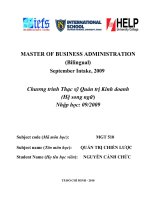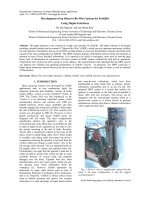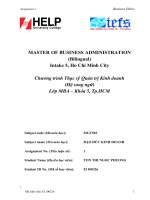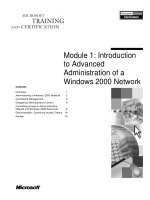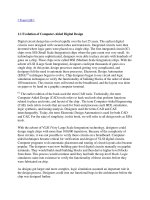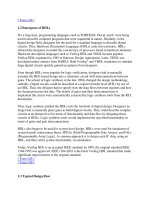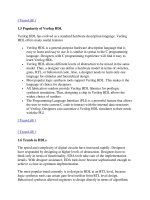Tài liệu Syllabus of Master of Business Administration (With effect from 2012-13) : Visvesvaraya Technological University, Belgaum pptx
Bạn đang xem bản rút gọn của tài liệu. Xem và tải ngay bản đầy đủ của tài liệu tại đây (716.29 KB, 186 trang )
1
Syllabus of
Master of Business
Administration
(With effect from 2012-13)
MBA
Visvesvaraya Technological University
,
Belgaum
Web:
www.vtu.ac.in
e-Mail:
2
Regulations Governing
THE MASTER OF BUSINESS ADMINISTRATION
OMB 1 TITLE OF THE COURSE
OMB 1.1 The course shall be called Master of Business
Administration course which is abbreviated as MBA.
OMB 2 DURATION OF THE COURSE
OMB 2.1 The MBA course shall be of two years’ duration, extended
over four semesters.
OMB 2.2 The candidates shall be allowed a maximum of four years
(8 semesters) of duration to be eligible for the award of MBA degree, failing
which he / she shall have to register once again as a fresh candidate.
OMB 3 ELIGIBILITY FOR ADMISSION
OMB 3.1 Admission is open, to the Master of Business
Administration Course, to all the candidates who possess a Bachelor’s
Degree of minimum three years’ duration recognized by this university or
who have passed any other examination recognized by this university as
equivalent thereto.
OMB 3.2 The candidates shall have passed the prescribed qualifying
examinations with not less than 50% of the marks in aggregate of all the
years / semesters of the degree examinations. However, in the case of
candidate belonging to SC/ST and any other groups classified by the
Government of Karnataka for such purpose from time to time, the aggregate
percentage of marks in the qualifying examinations shall be not less than
45%.
OMB 3.3 Government seats and Management seats in colleges shall
be filled as per the Government Order issued from time to time in this regard.
3
OMB 3.4 All graduates other than the graduates of VTU shall have to
obtain Eligibility Certificate from the VTU to seek MBA admissions in any
of the colleges affiliated to VTU.
OMB 3.5 The Calendar of events in respect of the course shall be
fixed by the University from time to time.
OMB 4 ATTENDANCE REQUIREMENT
OMB 4.1 Each semester of the course shall be treated as a separate
unit for calculation of the attendance.
OMB 4.2 A candidate shall be considered to have satisfied the
attendance requirement if he / she has attended not less than 85% of the
classes in each subject of the respective semesters (Theory, Seminars,
Practical Training, etc) actually conducted up to the end of the semester.
OMB 4.3 A candidate, who does not satisfy the attendance
requirement, mentioned as above, shall not be eligible to appear for the
Examination of the semester and shall be required to repeat that semester
along with regular students during the subsequent year.
OMB 4.4 If a candidate, for any reason, discontinues the course after
the first / third semester he / she may be permitted to register for the second /
fourth semester, after one year with the immediate subsequent batch, subject
to the condition that he / she shall complete the class work and seminar
including the project / internship within maximum stipulated period of four
years from the date of commencement of the course.
OMB 4.5 The Principals of the concerned Colleges shall display regularly,
the list of such candidates who fall short of attendance, on the notice boards.
OMB 4.6 The list of the candidates falling short of attendance shall be sent
to the University at least one week prior to the commencement of
examination.
4
OMB 5 INTERNAL ASSESSMENT
OMB 5.1 Each candidate shall obtain not less than 50% of the marks
prescribed for the Internal Assessment of each subject, including seminars.
OMB 5.2 Internal Assessment Marks shall be based on assignments /
tests / oral examinations / Practical Components and seminar conducted in
respective subjects.
OMB 5.3 Candidates obtaining less than 50% of the Internal
Assessment marks in any subject shall not be eligible to appear for the
examination in that subject. However, the Head of the Department may
arrange for the improvement of Internal Assessment marks in the subject /
subjects in subsequent semesters and the candidate be provided an
opportunity for taking the examination at the end of the immediate
subsequent semester to fulfill the provisions of OMB 5.1.
OMB 5.4 The student shall write the Internal Assessment Test in
Blue Books which shall be maintained by the Principal for at least one month
after the announcement of result for verification by the University Officials.
OMB 5.5 Every sheet of Internal Assessment marks list shall bear the
signatures of the concerned Teacher, Head of the Department and the
Principal of the Institution.
OMB 5.6 The Internal Assessment marks list shall be displayed on
the Notice Board and corrections, if any, shall be incorporated before sending
to the University.
OMB 5.7 No corrections of the Internal Assessment marks shall be
entertained after the submission of marks list to the University.
5
OMB 6 PAPER SETTING AND EVALUATION OF THEORY
ANSWER PAPER
OMB 6.1 Question papers in theory subjects shall be set by the
Examiners appointed for that purpose by the University.
OMB 6.2 There shall be double valuation of theory papers in the
University Examinations. The Answer Papers shall be valued by two
examiners appointed by the University.
OMB 6.3 If the difference between the marks awarded by the two
Examiners is not more than 15 per cent of the maximum marks, the marks
awarded to the candidate shall be the average of two evaluations.
If the difference between the marks awarded by two examiners is more than
15, the script shall be evaluated by a third examiner. The average of marks of
nearest two valuations shall be considered as marks secured by the candidate.
However, if one of the three marks falls exactly midway between the other
two, then the highest two marks shall be taken for averaging.
OMB 7 INTERNSHIP (PROJECT WORK)
OMB 7.1 All the candidates shall undertake an Internship (Project
Work) of twelve weeks’ duration during the fourth semester. The Internship
should have industry orientation and the work should be certified by the
concerned organization where the student has undertaken the Internship.
OMB 7.2 The Internship report shall be submitted by the students as
per the guidelines prescribed by the university from time to time.
OMB 7.3 For the Project work (Internship), the Internal Guide shall
carry out the internal assessment for 100 marks.
OMB 7.4 An external examiner shall separately value the Internship
report for 100 marks. A Viva voce examination for 100 marks shall be jointly
conducted by a panel of examiners consisting of an external and internal
examiner. This examination has to be conducted in batches of 5 students. The
Internship marks will be included in the 4
th
semester scheme.
6
OMB 7.5 A candidate shall secure a minimum of 50% of marks in
aggregate (in the internal assessment, evaluation of Internship report and viva
voce examination). In the event of his failing to secure the 50% marks, he
shall have to re-do the Internship.
OMB 8 ELIGIBILITY FOR PASSING
OMB 8.1 There shall be a university examination at the end of each
semester.
OMB 8.2 A candidate shall obtain a minimum of 40% of marks in the
University Examination and a minimum of 50% of marks in the aggregate
including the Internal Assessment marks for passing in a theory subject. The
passing marks in the internship shall be as provided under OMB 7.5 and 8.4.
OMB 8.3 There shall be no restriction for promotion of a candidate
from the first semester to the second semester and from the third semester to
the fourth semester provided he/she has fulfilled the attendance requirement
as per OMB 4.2.
OMB 8.4 A candidate who has not failed in more than four heads of
passing from the first and second semester put together shall be eligible for
promotion from the second semester to the third semester.
OMB 9 AWARD OF CLASS & RANK
OMB 9.1 The candidates, who have passed in all the subjects of all
four semesters and in the internship, shall be declared to have passed the
course.
OMB 9.2 Classes shall be awarded to the candidates who have passed
in all subjects at each semester on the aggregate marks obtained by them in
the first attempt at the respective semester.
OMB 9.3 A candidate who secures 70% and above marks in
aggregate in first attempt shall be declared to have passed in first class with
distinction.
7
OMB 9.4 A candidate who secures 60% or more marks but less than
70% in aggregate in first attempt shall be declared to have passed in first
class.
OMB 9.5 A candidate who secures 50% or more marks but less than
60% in aggregate in first attempt shall be declared to have passed in second
class.
OMB 9.6 Classes shall be awarded at the degree level to the
candidates who have completed the Course based on the first attempt
aggregate of all four semesters taken together.
OMB 9.7 The number of ranks declared at degree level shall be 10
or 1% of students appeared for examination whichever is less. The ranks
shall be declared on the basis of the aggregate marks of all the four semesters
taken together, provided the candidates has passed in all these four semesters
in first attempt only.
OMB 10 SPECIALISATION OF STREAMS
OMB 10.1 A student may opt for any one of the specialization
streams.
OMB 10.2 Every student shall be required to take four papers in the
specialization stream in the third semester and four in the fourth semester.
OMB 11 REJECTION OF RESULTS
OMB 11.1 A candidate may at his / her desire reject his / her latest
semester results of University Examination with respect to all subjects of that
particular semester examination. Rejection of result of individual subjects
shall not be permitted. Rejection shall be permitted only once during the
entire course. Provided that earlier sessional marks of the rejected semester
shall be retained. Provided further that in 4
th
semester the rejection shall not
include Internship Work.
If the rejection of the University examination results of the semester happens
to be of an odd semester, the candidate can take admission to the immediate
next even semester. However, if the rejection of the University result is of
even semester, the candidate cannot take admission to the next odd semester.
8
OMB 11.2 Application for rejection shall be submitted to the Registrar
(Evaluation) of the University, through the Principal of the college, within
thirty days from the date of announcement of results.
OMB 11.3 A candidate, who opts for rejection is eligible for the award
of class and distinction, but is not eligible for the award of ranks.
Note: Guidelines on Practical components:
The objective of Practical components is to make the students understand
how theory is applied in business. This should help the students to develop
their skills required to become industry ready. Practical component
mentioned under each subject are only indicative. Faculty may adopt any
other relevant practical tasks / activities focusing on practical application of
the theory.
Important: Questions should not be set from practical components area
in the University theory examination of the concerned subject.
9
SCHEME OF TEACHING AND EXAMINATION
MASTER OF BUSINESS ADMINISTRATION
I SEMESTER
Subject
code
Title of the Subject
Teaching hours
/
week
Duration
of Exam
in Hours
Marks for
Total
Marks
Lecture
Practical
/
Field Work /
Assignment
Total IA Exam.
12MBA11 Managing Organizations 4 1 5 3 50 100 150
12MBA12 Managerial Economics 4 1 5 3 50 100 150
12MBA13 Quantitative Methods - I 4 1 5 3 50 100 150
12MBA14 Accounting for Management 4 1 5 3 50 100 150
12MBA15 IT for Managers 4 1 5 3 50 100 150
12MBA16 Managerial Communication 4 1 5 3 50 100 150
Total
24
6
30
18
300
600
900
10
II SEMESTER
Subject
code
Title of the Subject
Teaching hours
/
week
Duration
of Exam
in Hours
Marks for
Total
Marks
Lecture
Practical
/
Field Work /
Assignment
Total IA Exam.
12MBA21 Business, Government and
Society
4 1
5
3 50 100 150
12MBA22 Quantitative Methods – II 4 1 5 3 50 100 150
12MBA23 Macro Business Environment
4 1 5 3 50 100 150
12MBA24 Marketing Management 4 1 5 3 50 100 150
12MBA25 Financial Management 4 1 5 3 50 100 150
12MBA26 Human Resource
Management
4 1
5
3 50 100 150
Total
24
6
30
18
300
600
900
11
III SEMESTER
Subject
code
Title of the Subject
Tea
ching hours/week
Duration
of Exam
in Hours
Marks for
Total
Marks
Lecture
Practical/Fiel
d
Work/Assign
ment
Total IA Exam.
12MBA31 Strategic Management 4 1 5 3 50 100 150
12MBA32 Operations Management 4 1 5 3 50 100 150
ELECTIVE 1 4 1 5 3 50 100 150
ELECTIVE 2 4 1 5 3 50 100 150
ELECTIVE 3 4 1 5 3 50 100 150
ELECTIVE 4 4 1 5 3 50 100 150
Total
24
6
30
18
300
600
900
12
MARKETING AREA FINANCE AREA BANKING & INSURANCE AREA
Sub
Code
Subject
Sub
Code
Subject
Sub
Code
Subject
12MBA
MM311
Business Marketing
12MBA
FM321
Advanced Financial
Management
12MBABI
331
Principles & Practices
of Banking &
Insurance
12MBA
MM312
Sales & Retail
Management
12MBA
FM322/
12MBA
BI332
Investment Management
12MBABI
332/12M
BAFM322
Investment
Management
12MBA
MM313
Consumer Behavior
12MBA
FM323/
12MBA
BI333
Banking & Financial
Services
12MBABI
333/12M
BAFM323
Banking & Financial
Services
12MBA
MM314
Services Marketing
12MBA
FM324
Cost Management
12MBABI
334
Banking & Insurance
Products
13
HUMAN RESOURCE AREA CREATIVE MANAGEMENT AREA
Sub Code
Subject
12MBAHR341
Recruitment &
Selection
12MBAHR342
Compensation &
Benefits
12MBAHR343
Learning &
Development
12MBAHR344
Labour Law &
Employee Relations
Sub Code
Subject
12MBACM351
Ideation, Brands and
Business
12MBACM352
Engagement Planning
and New Media
12MBACM353
Project Management
and Budgeting
12MBACM354
Market Research and
Insights
14
IV SEMESTER
Subject
code
Title of the Subject
Teaching hours/week
Duration
of Exam
in Hours
Marks for
Total
Mark
s
Lecture
Practical
/Fi
eld
Work/Assig
nment
Total IA
Exam.
/Viva
Voce
External
Assess
ment
12MBA41 Supply chain
Management
4 1
5
3 50 100 150
12MBA42 Total Quality
Management
4 1
5
3 50 100 150
ELECTIVE 5 4 1 5 3 50 100 150
ELECTIVE 6 4 1 5 3 50 100 150
ELECTIVE 7 4 1 5 3 50 100 150
ELECTIVE 8 4 1 5 3 50 100 150
12MBA47
Internship
- - - 100 100 100 300
Total
24
6
3
0
18
4
00
7
00
100
1200
15
MARKETING AREA FINANCE AREA BANKING & INSURANCE AREA
Sub Code
Subject
Sub Code
Subject
Sub Code
Subject
12MBAM
M415
Rural Marketing
12MBAFM
425
Project Appraisal
Planning &
Control
12MBABI4
35
Treasury & Risk
Management
12MBAM
M416
Strategic Brand
Management
12MBAFM
426/
12MBABI4
36
International
Financial
Management
12MBABI4
36/
12MBAFM
426
International
Financial
Management
12MBAM
M417
Integrated
Marketing
Communications
12MBAFM
427
Risk
Management
12MBABI4
37
Legal Aspects of
Banking &
Insurance
12MBAM
M418
International
Marketing
Management
12MBAFM
428
Tax Management
12MBABI4
38
Strategic Credit
Management
16
HUMAN RESOURCE AREA CREATIVE MANAGEMENT AREA
Sub Code
Subject
Sub Code
Subject
12MBAHR445
International Human
Resource Management
12MBACM455
Modern Retail and Private
Brands
12MBAHR446
Personal Growth &
Interpersonal
Effectiveness
12MBACM456 Future of Brands and Business
12MBAHR447
Organization
Development & Change
12MBACM457 Leadership and its Practice
12MBAHR448
Strategic Talent
Management
12MBACM458
Branded Content and the Future
of Media
17
SEMESTER I
MANAGING ORGANIZATIONS
Sub Code : 12MBA11 IA Marks : 50
No. of Lecture Hrs /week : 04 Exam Hrs. : 03
Total No. of Lecture Hrs. : 56 Exam Marks : 100
Practical Component : 01 Hr/ Week
Part A- Principles of Management
Module I : Introduction (6 Hours)
Management: Introduction, definition of management, nature, purpose and
functions, levels and types of managers, managerial roles, skills for
managers, evolution of management thought, Fayol’s fourteen principles of
management and recent trends in management.
Module II: Planning and organizing (12 Hours)
Planning: Nature of planning, planning process, objectives, MBO, strategies,
level of strategies, policies, methods and programs, planning premises,
decision making, process of decision making, types of decisions, techniques
in decision making.
Organizing: Organization structure, formal and informal organizations,
principles of organizations-chain of command, span of control, delegation,
decentralization, empowerment.
Functional, divisional, geographical, customer based and matrix
organizations, tram based structures, virtual organizations, boundary less
organizations.
Module III: Controlling (4 Hours)
Controlling, importance of controlling, controlling process, types of control,
factors influencing control effectiveness.
18
Recommended Books
1. Essentials of Management-Koontz, 8/e, McGraw Hill
2. Management: Text and Cases-VSP Rao, Excel Books
3. MGMT, An Innovative approach to teaching and learning Principles
of Management, Chuck Williams, Cengage Publications, 2010
4. Principles and practices of Management, Kiran Nerkar, Vilas
Chopde, Dreamtech Press, 2011
5. Management Theory & practice – Chandan J. S, Vikas Publishing
House.
6. Management Theory & Practice Text & Cases – Subba Rao P &
Hima Bindu, Himalaya Publication.
Part B- Organizational Behaviour
Module IV: Introduction (4 hours)
Organizational Behaviour: Introduction, definition, historical development,
fundamental principles of OB, contributing disciplines, challenges and
opportunities.
Module V: Foundations of Individual Behaviour (14 Hours)
Individual behaviour: Foundations of individual behavior.
Ability: Intellectual abilities, Physical ability, the role of disabilities.
Personality: Meaning, formation, determinants, traits of personality, Big five
and MBTI, personality attributes influencing OB.
Attitude: Formation, components of attitudes, relation between attitude and
behaviour.
Perception: Process of perception, factors influencing perception, link
between perception and individual decision making.
Emotions: Affect, mood and emotion and their significance, basic emotions,
emotional intelligence, self awareness, self management, social awareness,
relationship management.
19
Module VI: Motivation and Leadership (8 Hours)
Motivation: Meaning, theories of motivation-needs theory, two factor theory,
Theory X and Y, application of motivational theories.
Leadership: Meaning, styles of leadership, leadership theories, trait theory,
behavioural theories, managerial grid, situational theories-Fiedler’s model,
SLT, transactional and transformation leadership.
Module VII: Group Behaviour (4 Hours)
Definition, types, formation of groups, building effective teams.
Conflict: Meaning, nature, types, process of conflict, conflict resolution.
Power and politics: Basis of power, effectiveness of power tactics. The ethics
of behaving politically.
Module VIII: Organizational culture (4 Hours)
Importance, managing culture. Work stress and its management.
Practical Component
• Studying organizational structures of any 10 companies and
classifying them into different types of organizations which are
studied in Module 2 and justifying why such structures are chosen
by those organizations.
• Preparing the leadership profiles of any 5 business leaders and
studying their leadership qualities and behaviours with respects to
the trait, behavioural and contingency theories studied.
• Identifying any five job profiles and listing the various types
abilities required for those jobs and also the personality
traits/attributes required for the jobs identified.
20
Note: Faculty can either identify the organizations/ leaders/jobs or students
can be allowed to choose the same.
RECOMMENDED BOOKS:
1. Organizational behaviour, Stephen P Robbins, Timothy A. Judge,
Neharika Vohra, Pearson, 14th Edition, 2012.
2. Introduction to Organisational Behaviour – Michael Butler, Jaico
Publishing House,
3. Organization Behaviour – Ashwathappa, Himalaya Publication
House
4. ORGB - Nelson, Quick, Khanelwal, 2/e, Cengage Learning, 2012.
5. Organizational behaviour - Anada Das Gupta, Biztantra, 2011.
6. Organizational behaviour: A modern approach - Arun Kumar and
Meenakshi, Vikas Publishing House, 2011.
7. Organizational behaviour – Rao V. S. P, Excel Books, 2009.
REFERENCE BOOKS:
1. Organizational Behaviour - Fred Luthans, 12/e, Mc-Graw Hill
International, 2011.
2. Management and organizational Behaviour - Laurie J Mullins,
Pearson education
3. Fundamentals of organizational behaviour - Slocum/Hillriegel.
Cengene Learning
4. Organizational Behaviour - Aquinas P. G, Excel Books.
MANAGERIAL ECONOMICS
Sub Code : 12MBA12 IA Marks : 50
No. of Lecture Hrs /week : 04 Exam Hrs. : 03
Total No. of Lecture Hrs. : 56 Exam Marks : 100
Practical Component : 01 Hr/ Week
Module I: Introduction to Economic (8 Hours)
Managerial Economics: Meaning, Nature, Scope, & Significance. Uses of
Managerial Economics. Role and Responsibilities of Managerial Economist.
Relationship of Managerial Economics with Statistics, Accounting and
Operations Research. The Basic process of decision making.
Module II: Fundamental Concepts of Managerial Economics (6 Hours)
Opportunity Costs, Incremental Principle, Time perspective, Discounting and
Equi-Marginal principles.
21
Theory of the Firm: Firm and Industry, Forms of Ownership, Objectives of
the firm, alternate objectives of firm. Managerial theories: Baumol’s Model,
Marris’s Hypothesis, Williamson’s Model. Behavioural theories: Simon’s
Satisficing Model, Cyert and March Model.Agency theory.
Module III: Demand analysis (10 Hours)
Law of Demand, Exceptions to the Law of Demand, Elasticity of Demand –
Classification of Price, Income & Cross elasticity, Advertising and
promotional elasticity of demand. Uses of elasticity of demand for
Managerial decision making, Measurement of elasticity of demand. Law of
supply, Elasticity of supply. Demand forecasting: Meaning & Significance,
Methods of demand forecasting. (No problems)
Note:Illustrative numerical examples to be used to explain the concepts.
Module IV: Cost Analysis (6 Hours)
Concepts, Types of cost, Cost curves, Cost – Output Relationship in the short
run and in the long run, LAC curve.
Module V: Production analysis (8 Hours)
Concepts, production function with one variable input - Law of Variable
Proportions. Production function with 2 variable inputs and Laws of returns
to scale. Indifference Curves, ISO-Quants & ISO-Cost line.Economies of
scale, Diseconomies of scale.
Module VI: Market structure and pricing practices: (8 Hours)
Perfect Competition, Features, Determination of price under perfect
competition.
Monopoly: Features, Pricing under monopoly. Price Discrimination.
Monopolistic Competition: Features, Pricing Under monopolistic
competition, Product differentiation.
Oligopoly: Features, Kinked demand Curve, Cartels, Price leadership.
Module VII Descriptive Pricing Approaches (4 hours)
Full cost pricing, Product line pricing, Product life cycle pricing.
Pricing Strategies: Price Skimming, Penetration Pricing, Loss leader pricing,
Peak Load pricing.
Module VIII: Profits (6 Hours)
Determinants of Short-term & Long-term profits. Classification –
Measurement of Profit. Break Even Analysis – Meaning, Assumptions,
Determination of BEA, Limitations, Uses of BEA in Managerial decisions.
22
Practical Components:
• Assessment of Impact of advertisement or sales promotion on the
demand of a product (Preferably FMCG goods)
• Study of demand elasticity for a product when there is a price
increase or price decrease.
• Market surveys/ consumer intention survey for an existing or a new
product/service.
• Opinion polls to understand the buyer behavior for a product or a
service.
• Demand forecasting – Mini project may be given to students to
assess the demand for a product or a service using any method.
• Preparing a project proposal for a new business venture to
understand the BEP using real time data.
• Exploring application and usage of econometric models by using
appropriate software packages.
RECOMMENDED BOOKS:
1. Managerial Economics –D M Mithani, 5/e, Himalaya Publication.
2011.
2. Managerial Economics – D N Dwivedi, 7/e, Vikas Publication. 2008
3. Managerial Economics – Geethika, Ghosh&Choudhury, 2/e,
McGraw Hill. 2011
4. Managerial Economics – Dominick Salvotore, 6/e, Oxford
Publishers, 2010.
5. Managerial Economics - Craig H Petersen, W. Chris Lewis &
Sudhir K Jain, 4/e, Pearson Education, 2006.
6. Managerial Economics: Analysis, Problems and Cases – Truet &
Truet, 8/e, Wiley, 2009.
REFERENCE BOOKS:
1. Managerial Economics-Atmanand, 2/e, Excel Books, 2010.
2. Managerial Economics-Allen, Weisgelt, Doherty and Mansfield,
7/e,Viva, 2010.
3. Managerial Economics – Yogeshmaheswari, 2/e,PHI, 2011
4. Managerial Economics – Samuelson & Marks, 5/e, Wiley, 2009.
5. Managerial Economics – Keating & Wilson, 2/e, Biztantra, 2009.
6. Managerial Economics – Hirschey, 2/e, Cengage Learning, 2010.
7. Managerial Economics: Case Study solutions – Kaushal H, 1/e,
Macmillan, 2011.
8. Managerial Economics – Nadar & Vijayan, 2/e, PHI, 2010.
23
QUANTITATIVE METHODS : I
Sub Code : 12MBA13 IA Marks : 50
No. of Lecture Hrs /week : 04 Exam Hrs. : 03
Total No. of Lecture Hrs. : 56 Exam Marks : 100
Practical Component : 01 Hr/ Week
Module I: Business Research (6 Hours)
An overview: Research process and Types of Research, problem formulation,
management problem v/s. research problem, .Approaches to Research,
Importance of literature review.
Business Research Design: Steps involved in a research design.
Exploratory research: Meaning, suitability, collection.
Descriptive research: Meaning, types of descriptive studies, data collection
methods
Causal research: Meaning, various types of experimental designs, types of
errors affecting research design.
Analytical research: Introduction to analytical research.
Module II: Sampling and Data Collection (8 Hours)
Sampling and sampling distribution: Meaning, Steps in Sampling process,
Types of Sampling - Probability and non probability Sampling Techniques.
Data collection: Primary and Secondary data – Sources –
advantages/disadvantages.
Data collection Methods: Observations, Survey, Interview and Questionnaire
design, Qualitative Techniques of data collection.
Module III: Measurement & Scaling Techniques (6 hours)
Nominal Scale, Ordinal Scale, Interval Scale, Ratio Scale, Criteria for good
measurement, attitude measurement – Likert’s Scale, Semantic Differential
Scale, Thurstone-equal appearing interval scale. (Theory Only)
24
Module IV: Descriptive statistics (6 hours)
Measures of central tendency: Average: Concept, Types – Mathematical
Averages: Arithmetic Mean, Median, Mode (No grouping table method).
Partition Values: Quartiles, Deciles and Percentiles - Comparison of the
Various Measures of Central Tendencies.
Module V: (6 Hours)
Measures of Dispersion: Standard Deviation – Variance – Coefficient of
Variance, Skewness: Relative measures of skewness- Karl- Pearson Co-
efficient of skewness.
Correlation and regression: Scatter Diagram, Karl Pearson’s coefficient of
Correlation (One way table only), Rank Correlation, Concurrent Deviation -
Regression: Method of Least Squares,
Module VI: Inferential Statistics (8 Hours)
Probability: Concept and Definition - Relevance to Management Decisions -
Sample Space and Events - Relevance of Permutations and Combinations to
Probability - Rules of Probability, Random Variables and Concept of
Probability Distribution. Theoretical Probability Distributions: Binomial,
Poisson and Normal and problems on it. Baye’s Theorem (No derivation)
Module VII: Hypothesis (10 Hours)
Formulation of hypothesis, Testing of hypothesis and inferences: Procedure
of testing hypothesis, Type I and Type II Errors.
Parametric tests: Z-Test, t-test, F-test, Analysis of Variance – One-Way and
Two-way classification.
Module VIII: Non parametric tests (6 Hours)
Chi-Square test (Problems), Multivariate analysis (Theory only). Report
writing
25
Practical Components:
Students are expected to Find the following parameters or Prepare for a given
dataset using MS Excel and SPSS.
• Draw all types of Diagrams and Graphs
• Construction of one way and two way tables
• Arithmetic Mean
• Geometric Mean
• Harmonic Mean
• Median, Mode
• Quartiles, Deciles, Percentiles
• Minimum, Maximum, Range
• Quartile Deviation, Mean Deviation, Standard Deviation, Variance,
Coefficient of Variance
• Co-efficient of Skewness: - Karl- Pearson, Bowley, Kelly,
• Correlation coefficient
• Regression coefficient – Slope (b in y = a + bx)
• Regression Constant – Intercept (a in y = a + bx)
• Z-Test, t-test, F-test Values
• Chi-Square test Values
• Analysis of Variance (ANOVA) Values
• Research Proposal writing
• Data Interpretation and report writing: Short and Long reports:
Report presentation methods, ex: Power Point Presentation, etc
RECOMMENDED BOOKS:
1. Fundamentals of Statistics, S. C. Gupta, Himalaya Publishing
House, 7/e, 2012.
2. Research Methodology: Concepts and Cases – Deepak Chawla &
Neena Sondhi, Vikas, 2011
3. Marketing Research by Naresh K. Malhotra, Pearson publishers,
2012
4. Business Research Methods–Donald R. Cooper & Pamela S
Schindler, 9/e, TMH,2007.
5. Statistics for Business and Economics - Anderson, Sweeney,
William, 11/e, Cengage Learning, 2012.
6. Methodology of Research in Social Sciences – Krishnaswami O. R,
Ranganatham M, HPH, 2007.
7. Statistics for Management, Levin and Rubin
